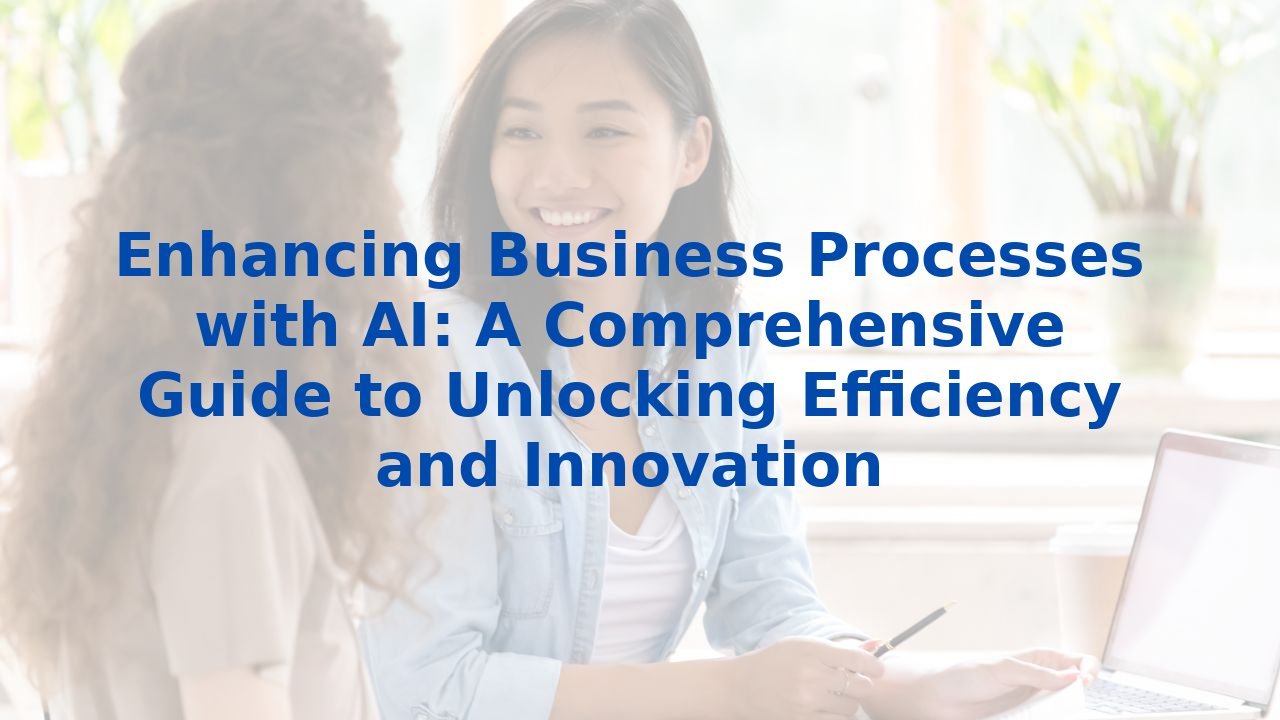Enhancing Business Processes with AI: A Comprehensive Guide to Unlocking Efficiency and Innovation
Enhancing Business Processes with AI: A Comprehensive Guide to Unlocking Efficiency and Innovation
In an age where every second counts and competition is relentless, the quest for operational excellence isn't merely an aspiration—it's a necessity. Organizations today are embracing innovative solutions to streamline workflows, and one of the most transformative tools at their disposal is Artificial Intelligence (AI). Let's explore how AI can enhance business processes, emphasizing the promising benefits that emerge when organizations make this leap towards innovation.
Understanding Business Process Management
At its core, Business Process Management (BPM) involves a strategic approach to designing, executing, and monitoring business processes. Its goal is clear: to achieve greater efficiency and effectiveness in operations. However, the traditional BPM framework can be labor-intensive and slow to adapt to the changing tide of business demands.
How AI Enhances Business Processes
By weaving AI into the fabric of business processes, organizations can unlock a realm of potential that streamlines operations, enhances decision-making, and optimizes overall performance. Let’s dissect some pivotal ways AI can supercharge these processes:
1. Data Analysis and Visualization
The ability of AI to process vast amounts of data instantaneously offers a monumental advantage to businesses. AI systems can identify trends, predict outcomes, and highlight critical areas of focus that humans might overlook. This profound data-driven insight paves the way for informed tactical and strategic decision-making that can set organizations apart from their competitors.
2. Process Building and Automation
Imagine a scenario where cumbersome manual tasks are replaced by seamless automation—this is where AI shines. By allowing organizations to establish new processes based on user-defined parameters, AI diminishes human errors and optimizes productivity. The result? A workforce that can focus on innovation rather than repetitive tasks.
3. Process Optimization
With the capability to simulate historical data, AI offers businesses valuable foresight. By predicting outcomes and analyzing key performance indicators (KPIs), organizations can identify bottlenecks before they jerk their operations into reverse. This proactive approach equips businesses to drive efficiency and adapt swiftly to emerging trends.
4. Real-Time Monitoring and Feedback
AI empowers businesses with the tool of real-time process mining. This capability allows organizations to monitor processes live, providing immediate feedback and detecting anomalies as they arise. Such responsiveness not only mitigates potential disruptions but also cultivates an environment poised to seize new opportunities.
5. Decision Support and Automation
The decision-making process can often feel like navigating a maze, but AI lightens this load considerably. By streamlining data delivery and simulating various scenarios, AI eliminates the noise and complexity involved in decision-making, enabling quicker, more informed choices that drive meaningful results.
Benefits of AI Integration
Integrating AI into business processes isn't just a tech upgrade; it's a holistic evolution. Here are some noteworthy advantages that organizations can expect:
- Improved Efficiency: Routine tasks are automated, allowing talent to engage in strategic initiatives crucial for growth.
- Enhanced Decision-Making: Data-driven insights lead to more precise decisions based on predictive analytics.
- Increased Productivity: Optimized workflows empower teams to maximize output without compromising on quality.
- Better Customer Experience: AI's capacity to analyze customer feedback creates personalized interactions that drive loyalty.
The Role of Employee Training
While the benefits of AI are manifold, the technology's effectiveness hinges on the experience and knowledge of the workforce employing it. Here’s why training is indispensable:
- Understanding AI Capabilities: Employees must grasp how AI operates and what it can achieve within their specific roles.
- Adapting to New Tools: Offering tailored training programs promotes the integration of AI into existing workflows.
- Data Interpretation: It's crucial for employees to understand data insights generated by AI, ensuring informed decisions are made.
- Continuous Learning: Given the rapid evolution of AI technologies, ongoing training becomes vital to keeping the workforce equipped with knowledge of the latest advancements.
Conclusion
Incorporating AI into business processes is not just a technological upgrade; it’s a strategic initiative aimed at fostering efficiency, improving decision-making, and optimizing workflows. By understanding its transformational capacity and investing in robust employee training, organizations are positioning themselves at the forefront of innovation. Embracing AI isn’t just about keeping pace—it’s about setting the pace in a competitive landscape. That’s where true success lies.
"The future of business doesn't only belong to those who integrate technology, but to those who empower their people to thrive alongside it."



